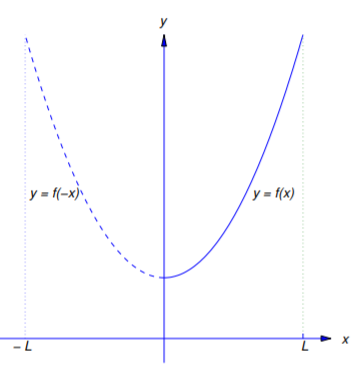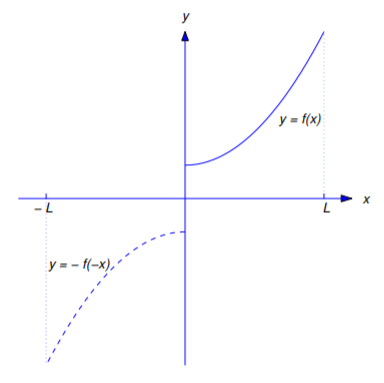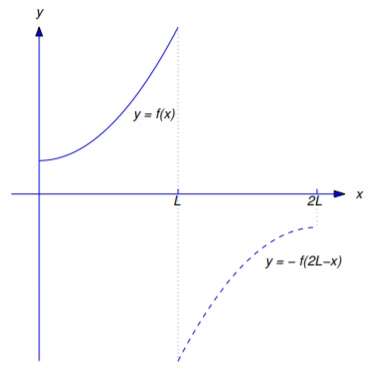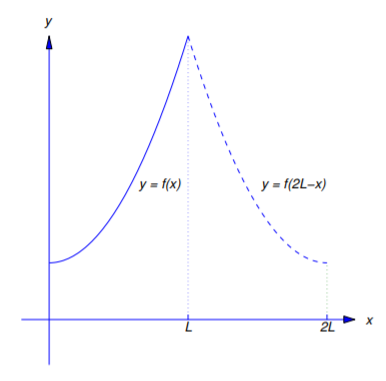8.3: Fourier Series II
( \newcommand{\kernel}{\mathrm{null}\,}\)
In this section we discuss Fourier expansions in terms of the eigenfunctions of Problems 1-4 for Section 8.1.
Fourier Cosine Series
From Exercise 8.1.20, the eigenfunctions
1,\, \cos{\pi x\over L}, \, \cos{2\pi x\over L},\dots, \, \cos{n\pi x\over L},\dots\nonumber
of the boundary value problem
\label{eq:11.3.1} y''+\lambda y=0,\quad y'(0)=0,\quad y'(L)=0
(Problem 2) are orthogonal on [0,L]. If f is integrable on [0,L] then the Fourier expansion of f in terms of these functions is called the Fourier cosine series of f on [0,L]. This series is
a_0+\sum_{n=1}^\infty a_n\cos{n\pi x\over L},\nonumber
where
a_0={\int_0^Lf(x)\,dx\over\int_0^L\,dx}={1\over L}\int_0^Lf(x)\,dx\nonumber
and
a_n={\int_0^Lf(x)\cos{n\pi x\over L}\,dx\over\int_0^L \cos^2{n\pi x\over L}\,dx}={2\over L}\int_0^Lf(x)\cos{n\pi x\over L}\,dx,\quad n=1,2,3,\dots.\nonumber
Comparing this definition with Theorem 8.2.6a shows that the Fourier cosine series of f on [0,L] is the Fourier series of the function
f_{1}(x)=\left\{\begin{array}{cc}{f(-x),}&{-L<x<0,}\\{f(x),}&{}0\leq x\leq L\end{array} \right.\nonumber
obtained by extending f over [-L,L] as an even function (Figure \PageIndex{1}).

Applying Theorem 8.2.4 to f_1 yields the next theorem.
Theorem \PageIndex{1}
If f is piecewise smooth on [0,L], then the Fourier cosine series
C(x)=a_0+\sum_{n=1}^\infty a_n\cos{n\pi x\over L}\nonumber
of f on [0,L], with
a_0={1\over L}\int_0^Lf(x)\,dx \quad \text{and} \quad a_n={2\over L}\int_0^Lf(x)\cos{n\pi x\over L}\,dx,\quad n=1,2,3,\dots,\nonumber
converges for all x in [0,L]; moreover,
C(x)=\left\{\begin{array}{cl}{f(0+)}&{if\: x=0}\\{f(x)}&{if\: 0<x<L\:and\:f\:is\:continuous\:at\:x}\\{\frac{f(x-)+f(x+)}{2}}&{if\:0<x<L\:and\:f\:is\:discontinuous\:at\:x}\\{f(L-)}&{if\:x=L}\end{array} \right. \nonumber
Example \PageIndex{1}
Find the Fourier cosine series of f(x)=x on [0,L].
The coefficients are
a_0={1\over L}\int_0^Lx\,dx=\left. {1\over L}{x^2\over2} \right|_{0}^{L}={L\over2}\nonumber
and, if n\ge1
\begin{aligned} a_n&={2\over L}\int_0^Lx\cos{n\pi x\over L}\,dx =\left. {2\over n\pi}\left[x\sin{n\pi x\over L}\right|_{0}^{L}- \int_0^L \sin{n\pi x\over L}\,dx\right]\\ &=-{2\over n\pi}\int_0^L \sin{n\pi x\over L}\,dx =\left.{2L\over n^2\pi^2}\cos{n\pi x\over L}\right|_{0}^{L} ={2L\over n^2\pi^2}[(-1)^n-1]\\ &= \left\{\begin{array}{cl} -{4L\over(2m-1)^2\pi^2}&\mbox{if $n=2m-1$},\\ 0&\mbox{if $n=2m$}. \end{array}\right.\end{aligned}\nonumber
Therefore
C(x)=\frac{L}{2}-\frac{4L}{\pi ^{2}}\sum _{n=1}^{\infty}\frac{1}{(2n-1)^{2}}\cos\frac{(2n-1)\pi x}{L}\nonumber
Theorem \PageIndex{1} implies that
C(x)=x,\quad 0\le x\le L.\nonumber
Fourier Sine Series
From Exercise 8.1.19, the eigenfunctions
\sin{\pi x\over L}, \, \sin{2\pi x\over L},\dots, \, \sin{n\pi x\over L},\dots\nonumber
of the boundary value problem
y''+\lambda y=0,\quad y(0)=0,\quad y(L)=0\nonumber
(Problem 1) are orthogonal on [0,L]. If f is integrable on [0,L] then the Fourier expansion of f in terms of these functions is called the Fourier sine series of f on [0,L]. This series is
\sum_{n=1}^\infty b_n\sin{n\pi x\over L},\nonumber
where
b_n={\int_0^Lf(x)\sin{n\pi x\over L}\,dx\over\int_0^L \sin^2{n\pi x\over L}\,dx}={2\over L}\int_0^Lf(x)\sin{n\pi x\over L}\,dx,\quad n=1,2,3,\dots.\nonumber
Comparing this definition with Theorem 11.2.6b shows that the Fourier sine series of f on [0,L] is the Fourier series of the function
f_{2}(x)=\left\{\begin{array}{cc}{-f(-x),}&{-L<x<0}\\{f(x),}&{0\leq x\leq L,}\end{array} \right.\nonumber
obtained by extending f over [-L,L] as an odd function (Figure \PageIndex{2}).

Applying Theorem 8.2.4 to f_2 yields the next theorem.
Theorem \PageIndex{2}
If f is piecewise smooth on [0,L], then the Fourier sine series
S(x)=\sum_{n=1}^\infty b_n\sin{n\pi x\over L}\nonumber
of f on [0,L], with
b_n={2\over L}\int_0^Lf(x)\sin{n\pi x\over L}\,dx,\nonumber
converges for all x in [0,L]; moreover,
S(x)=\left\{\begin{array}{cl}{0}&{if\:x=0}\\{f(x)}&{if\:0<x<L\:and\:f\:is\:continuous\:at\:x}\\{\frac{f(x-)+f(x+)}{2}}&{if\:0<x<L\:and\:f\:is\:discontinuous\:at\:x}\\{0}&{if\:x=L}\end{array} \right.\nonumber
Example \PageIndex{2}
Find the Fourier sine series of f(x)=x on [0,L].
Solution
The coefficients are
\begin{aligned} b_n&={2\over L}\int_0^Lx\sin{n\pi x\over L}\,dx =\left.-{2\over n\pi}\left[x\cos{n\pi x\over L}\right|_{0}^{L}- \int_0^L \cos{n\pi x\over L}\,dx\right]\\ &=\left. (-1)^{n+1}{2L\over n\pi}+{2L\over n^2\pi^2}\sin{n\pi x\over L}\right|_{0}^{L} =(-1)^{n+1}{2L\over n\pi}.\end{aligned}\nonumber
Therefore
S(x)=-{2L\over\pi}\sum_{n=1}^\infty{(-1)^n\over n} \sin{n\pi x\over L}.\nonumber
Theorem \PageIndex{2} implies that
S(x)= \left\{\begin{array}{cl} x,&0\le x< L,\\0,& x=L. \end{array}\right.\nonumber
Mixed Fourier Cosine Series
From Exercise 8.1.22, the eigenfunctions
\cos{\pi x\over 2L}, \, \cos{3\pi x\over 2L},\dots, \, \cos{(2n-1)\pi x\over 2L},\dots\nonumber
of the boundary value problem
\label{eq:8.3.2} y''+\lambda y=0,\quad y'(0)=0,\quad y(L)=0
(Problem 4) are orthogonal on [0,L]. If f is integrable on [0,L] then the Fourier expansion of f in terms of these functions is
\sum_{n=1}^\infty c_n\cos{(2n-1)\pi x\over2L},\nonumber
where
c_n={\int_0^Lf(x)\cos{(2n-1)\pi x\over2L}\,dx\over\int_0^L \cos^2{(2n-1)\pi x\over L}\,dx}={2\over L}\int_0^Lf(x)\cos{(2n-1)\pi x\over2L}\,dx.\nonumber
We’ll call this expansion the mixed Fourier cosine series of f on [0,L], because the boundary conditions of ( Equation \ref{eq:8.3.2}) are “mixed” in that they require y to be zero at one boundary point and y' to be zero at the other. By contrast, the “ordinary” Fourier cosine series is associated with ( Equation \ref{eq:8.3.1}), where the boundary conditions require that y' be zero at both endpoints.
It can be shown (Exercise 8.3.57) that the mixed Fourier cosine series of f on [0,L] is simply the restriction to [0,L] of the Fourier cosine series of
f_3(x)= \left\{\begin{array}{cl} f(x),&0\le x\le L,\\-f(2L-x),&L< x\le 2L \end{array}\right.\nonumber
on [0,2L] (Figure \PageIndex{3}).

Applying Theorem \PageIndex{1} with f replaced by f_3 and L replaced by 2L yields the next theorem.
Theorem \PageIndex{3}
If f is piecewise smooth on [0,L], then the mixed Fourier cosine series
C_M(x)=\sum_{n=1}^\infty c_n\cos{(2n-1)\pi x\over2L}\nonumber
of f on [0,L], with
c_n={2\over L}\int_0^Lf(x)\cos{(2n-1)\pi x\over2L}\,dx,\nonumber
converges for all x in [0,L]; moreover,
C_{M}(x)=\left\{\begin{array}{cl}{f(0+)}&{if\:x=0}\\{f(x)}&{if\:0<x<L\:and\:f\:is\:continuous\:at\:x}\\{\frac{f(x-)+f(x+)}{2}}&{if\:0<x<L\:and\:f\:is\:discontinuous\:at\:x}\\{0}&{if\:x=L}\end{array} \right.\nonumber
Example \PageIndex{3}
Find the mixed Fourier cosine series of f(x)=x-L on [0,L].
Solution
The coefficients are
\begin{aligned} c_n&={2\over L}\int_0^L(x-L)\cos{(2n-1)\pi x\over2L}\,dx\\ &=\left.{4\over(2n-1)\pi}\left[(x-L)\sin{(2n-1)\pi x\over2L}\right|_{0}^{L}-\int_0^L \sin{(2n-1)\pi x\over2L}\,dx\right]\\ &=\left.{8L\over(2n-1)^2\pi^2} \cos{(2n-1)\pi x\over2L}\right|_{0}^{L} =-{8L\over(2n-1)^2\pi^2}.\end{aligned}\nonumber
Therefore
C_M(x)=-{8L\over\pi^2}\sum_{n=1}^\infty{1\over(2n-1)^2} \cos{(2n-1)\pi x\over2L}.\nonumber
Theorem \PageIndex{3} implies that
C_M(x)= x-L,\quad 0\le x\le L.\nonumber
Mixed Fourier Sine Series
From Exercise 8.1.21, the eigenfunctions
\sin{\pi x\over 2L}, \, \sin{3\pi x\over 2L},\dots, \, \sin{(2n-1)\pi x\over 2L},\dots\nonumber
of the boundary value problem
y''+\lambda y=0,\quad y(0)=0,\quad y'(L)=0\nonumber
(Problem 3) are orthogonal on [0,L]. If f is integrable on [0,L], then the Fourier expansion of f in terms of these functions is
\sum_{n=1}^\infty d_n\sin{(2n-1)\pi x\over2L},\nonumber
where
d_n={\int_0^Lf(x)\sin{(2n-1)\pi x\over2L}\,dx\over\int_0^L \sin^2{(2n-1)\pi x\over2L}\,dx}={2\over L}\int_0^Lf(x)\sin{(2n-1)\pi x\over2L}\,dx.\nonumber
We’ll call this expansion the mixed Fourier sine series of f on [0,L].
It can be shown (Exercise 8.3.58) that the mixed Fourier sine series of f on [0,L] is simply the restriction to [0,L] of the Fourier sine series of
f_4(x)= \left\{\begin{array}{cl} f(x),&0\le x\le L,\\f(2L-x),&L< x\le 2L, \end{array}\right.\nonumber
on [0,2L] (Figure \PageIndex{4}).

Applying Theorem \PageIndex{2} with f replaced by f_4 and L replaced by 2L yields the next theorem.
Theorem \PageIndex{4}
If f is piecewise smooth on [0,L], then the mixed Fourier sine series
S_M(x)=\sum_{n=1}^\infty d_n\sin{(2n-1)\pi x\over2L}\nonumber
of f on [0,L], with
d_n={2\over L}\int_0^Lf(x)\sin{(2n-1)\pi x\over2L}\,dx,\nonumber
converges for all x in [0,L]; moreover,
S{M}(x)=\left\{\begin{array}{cl}{0}&{if\:x=0}\\{f(x)}&{if\:0<x<L\:and\:f\:is\:continuous\:at\:x}\\{\frac{f(x-)+f(x+)}{2}}&{if\:0<x<L\:and\:f\:is\:discontinuous\:at\:x}\\{f(L-)}&{if\:x=L}\end{array} \right.\nonumber
Example \PageIndex{4}
Find the mixed Fourier sine series of f(x)=x on [0,L].
Solution
The coefficients are
\begin{aligned} d_n&={2\over L}\int_0^Lx\sin{(2n-1)\pi x\over2L}\,dx\\ &=\left.-{4\over(2n-1)\pi}\left[x\cos{(2n-1)\pi x\over2L}\right|_{0}^{L}- \int_0^L \cos{(2n-1)\pi x\over2L}\,dx\right]\\ &={4\over(2n-1)\pi} \int_0^L \cos{(2n-1)\pi x\over2L}\,dx\\ &=\left.{8L\over(2n-1)^2\pi^2}\sin{(2n-1)\pi x\over2L}\right|_{0}^{L}=(-1)^{n+1}{8L\over(2n-1)^2\pi^2}.\end{aligned}\nonumber
Therefore
S_M(x)=-{8L\over\pi^2}\sum_{n=1}^\infty{(-1)^n\over(2n-1)^2} \sin{(2n-1)\pi x\over2L}.\nonumber
Theorem \PageIndex{4} implies that
S_M(x)=x,\quad 0\le x\le L.\nonumber
A Useful Observation
In applications involving expansions in terms of the eigenfunctions of Problems 1-4, the functions being expanded are often polynomials that satisfy the boundary conditions of the problem under consideration. In this case the next theorem presents an efficient way to obtain the coefficients in the expansion.
Theorem \PageIndex{5}
- If f'(0)=f'(L)=0, f'' is continuous, and f''' is piecewise continuous on [0,L], then \label{eq:11.3.3} f(x)=a_0+\sum_{n=1}^\infty a_n\cos{n\pi x\over L}, \quad 0\le x\le L, with \label{eq:11.3.4} a_0={1\over L}\int_0^L f(x)\,dx \quad \text{and} \quad a_n= {2L^2\over n^3\pi^3}\int_0^L f'''(x)\sin{n\pi x\over L}\,dx, \quad n\ge1. Now suppose f' is continuous and f'' is piecewise continuous on [0,L].
- If f(0)=f(L)=0, then f(x)=\sum_{n=1}^\infty b_n\sin{n\pi x\over L}, \quad 0\le x\le L,\nonumber with \label{eq:11.3.5} b_n=-{2L\over n^2\pi^2}\int_0^L f''(x)\sin{n\pi x\over L}\,dx.
- If f'(0)=f(L)=0, then f(x)= \sum_{n=1}^\infty c_n\cos{(2n-1)\pi x\over2L}, \quad 0\le x\le L,\nonumber with \label{eq:11.3.6} c_n=-{8L\over(2n-1)^2\pi^2}\int_0^L f''(x)\cos{(2n-1)\pi x\over2L} \,dx.
- If f(0)=f'(L)=0, then f(x)= \sum_{n=1}^\infty d_n\sin{(2n-1)\pi x\over2L}, \quad 0\le x\le L,\nonumber with \label{eq:11.3.7} d_n=-{8L\over(2n-1)^2\pi^2}\int_0^L f''(x)\sin{(2n-1)\pi x\over2L} \,dx.
- Proof
-
We'll prove (a) and leave the rest to you (Exercises 8.3.35, 8.3.42, and 8.3.50). Since f is continuous on [0,L], Theorem \PageIndex{1} implies ( Equation \ref{eq:11.3.3}) with a_0, a_1, a_2,... as defined in Theorem \PageIndex{1}. We already know that a_0 is as in ( Equation \ref{eq:11.3.4}). If n\ge1, integrating twice by parts yields
\begin{aligned} a_n&= {2\over L}\int_0^L f(x)\cos{n\pi x\over L}\,dx\\ &=\left.{2\over n\pi}\left[f(x)\sin{n\pi x\over L}\right|_{0}^{L} -\int_0^Lf'(x)\sin{n\pi x\over L}\,dx\right]\\ &=-{2\over n\pi} \int_0^Lf'(x)\sin{n\pi x\over L}\,dx \mbox{ (since $\sin0=\sin n\pi=0$)}\\ &=\left.{2L\over n^2\pi^2}\left[f'(x)\cos{n\pi x\over L}\right|_{0}^{L} -\int_0^Lf''(x)\cos{n\pi x\over L}\right]\,dx\\ &= -{2L\over n^2\pi^2}\int_0^Lf''(x)\cos{n\pi x\over L}\,dx \mbox{ (since $f'(0)=f'(L)=0$)}\\ &=\left.-{2L^2\over n^3\pi^3}\left[f''(x)\sin{n\pi x\over L}\right|_{0}^{L} -\int_0^Lf'''(x)\sin{n\pi x\over L}\,dx\right]\\ &= {2L^2\over n^3\pi^3}\int_0^Lf'''(x)\sin{n\pi x\over L}\,dx \mbox{ (since $\sin0=\sin n\pi=0$).}\end{aligned}\nonumber
(By an argument similar to one used in the proof of Theorem 8.3.1, the last integration by parts is legitimate in the case where f''' is undefined at finitely many points in [0,L], so long as it is piecewise continuous on [0,L].) This completes the proof.
Example \PageIndex{5}
Find the Fourier cosine expansion of f(x)=x^2(3L-2x) on [0,L].
Solution
Here
a_0={1\over L}\int_0^L(3Lx^2-2x^3)\,dx=\left.{1\over L}\left(Lx^3-{x^4\over2} \right)\right|_{0}^{L}={L^3\over2}\nonumber
and
a_n={2\over L}\int_0^L(3Lx^2-2x^3)\cos{n\pi x\over L}\,dx,\quad n\ge1.\nonumber
Evaluating this integral directly is laborious. However, since f'(x)=6Lx-6x^2, we see that f'(0)=f'(L)=0. Since f'''(x)=-12, we see from ( Equation \ref{eq:11.3.4}) that if n\ge1 then
\begin{aligned} a_n&=-{24L^2\over n^3\pi^3}\int_0^L\sin{n\pi x\over L}\,dx =\left.{24L^3\over n^4\pi^4}\cos{n\pi x\over L}\right|_{0}^{L}={24L^3\over n^4\pi^4}[(-1)^n-1]\\ &= \left\{\begin{array}{cl} -{48L^3\over(2m-1)^4\pi^4}&\mbox{if $n=2m-1$},\\ 0&\mbox{if $n=2m$.} \end{array}\right.\end{aligned}\nonumber
Therefore
C(x)={L^3\over2}-{48L^3\over\pi^4}\sum_{n=1}^\infty{1\over (2n-1)^4}\cos{(2n-1)\pi x\over L}.\nonumber
Example \PageIndex{6}
Find the Fourier sine expansion of f(x)=x(x^2-3Lx+2L^2) on [0,L].
Solution
Since f(0)=f(L)=0 and f''(x)=6(x-L), we see from ( Equation \ref{eq:11.3.5}) that
\begin{aligned} b_n&=- {12L\over n^2\pi^2}\int_0^L(x-L)\sin{n\pi x\over L}\,dx\\ &=\left.{12L^2\over n^3\pi^3}\left[(x-L)\cos{n\pi x\over L}\right|_{0}^{L} -\int_0^L\cos{n\pi x\over L}\,dx\right]\\ &=\left.{12L^2\over n^3\pi^3}\left[L-\frac{L}{n\pi}\sin\frac{n\pi x}{L}\right|_{0}^{L}\right] ={12L^3\over n^3\pi^3}.\end{aligned}\nonumber
Therefore
S(x)=\frac{12L^{3}}{\pi ^{3}}\sum_{n=1}^{\infty}\frac{1}{n^{3}}\sin\frac{n\pi x}{L}\nonumber
Example \PageIndex{7}
Find the mixed Fourier cosine expansion of f(x)=3x^3-4Lx^2+L^3 on [0,L].
Solution
Since f'(0)=f(L)=0 and f''(x)=2(9x-4L), we see from ( Equation \ref{eq:11.3.6}) that
\begin{aligned} c_n&= -{16L\over(2n-1)^2\pi^2} \int_0^L(9x-4L)\cos{(2n-1)\pi x\over2L}\,dx\\ &=\left.-{32L^2\over(2n-1)^3\pi^3}\left[(9x-4L)\sin{(2n-1)\pi x\over2L} \right|_{0}^{L}-9\int_0^L\sin{(2n-1)\pi x\over2L}\right]\,dx\\ &=\left.-{32L^2\over(2n-1)^3\pi^3} \left[(-1)^{n+1}5L+{18L\over(2n-1)\pi}\cos{(2n-1)\pi x\over2L} \right|_{0}^{L}\right] \\ &={32L^3\over(2n-1)^3\pi^3} \left[(-1)^n5+{18\over(2n-1)\pi}\right].\end{aligned}\nonumber
Therefore
C_{M}(x)=\frac{32L^{3}}{\pi ^{3}}\sum_{n=1}^{\infty}\frac{1}{(2n-1)^{3}}\left[(-1)^{n}5+\frac{18}{(2n-1)\pi } \right]\cos\frac{(2n-1)\pi x}{2L}\nonumber
Example \PageIndex{8}
Find the mixed Fourier sine expansion of
f(x)=x(2x^2-9Lx+12L^2)\nonumber
on [0,L].
Solution
Since f(0)=f'(L)=0, and f''(x)=6(2x-3L), we see from ( Equation \ref{eq:11.3.7}) that
\begin{aligned} d_{n}&=-\frac{48L}{(2n-1)^{2}\pi ^{2}}\int_{0}^{L}(2x-3L)\sin\frac{(2n-1)\pi x}{2L}dx \\ &=\left.\frac{96L^{2}}{(2n-1)^{3}\pi ^{3}}\left[(2x-3L)\cos\frac{(2n-1)\pi x}{2L}\right|_{0}^{L} - 2\int_{0}^{L}\cos\frac{(2n-1)\pi x}{2L}dx \right] \\ &=\left. \frac{96L^{2}}{(2n-1)^{3}\pi ^{3}}\left[3L-\frac{4L}{(2n-1)\pi }\sin\frac{(2n-1)\pi x}{2L}\right|_{0}^{L} \right] \\&=\frac{96L^{3}}{(2n-1)^{3}\pi ^{3}}\left[3+(-1)^{n}\frac{4}{(2n-1)\pi } \right] \end{aligned}\nonumber
Therefore
S_{M}(x)=\frac{96L^{3}}{\pi ^{3}}\sum_{n=1}^{\infty}\frac{1}{(2n-1)^{3}}\left[3+(-1)^{n}\frac{4}{(2n-1)\pi } \right]\sin\frac{(2n-1)\pi x}{2L}\nonumber


